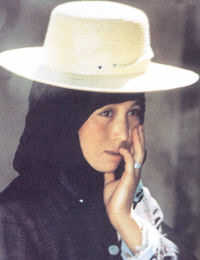 The Dongxiang ethnic minority, with a population of 373,872 (as of 1990), lives in Linxia Hui Autonomous Prefecture situated southwest of Lanzhou, capital city of the northwest province of Gansu. Half of them dwell in the Dongxiang Autonomous County, and the rest are scattered in the city of Lanzhou, the Xinjiang Uygur Autonomous Region, Ningxia Hui Autonomous Region, and some other places.
The Dongxiang ethnic minority, with a population of 373,872 (as of 1990), lives in Linxia Hui Autonomous Prefecture situated southwest of Lanzhou, capital city of the northwest province of Gansu. Half of them dwell in the Dongxiang Autonomous County, and the rest are scattered in the city of Lanzhou, the Xinjiang Uygur Autonomous Region, Ningxia Hui Autonomous Region, and some other places.
The Dongxiang language is basically similar to Mongolian, both belonging to the Mongolian Austronesian of the Altaic Phylum. Thus, it does not have its own character set. Nowadays, most of the Dongxiang people also speak Chinese, which is accepted as their common written language.
According to legends and historical data, the Dongxiangs probably originated from the Mongolians. As far back as the 13th century, Mongolian garrison units were stationed in the Dongxiang area. In these units were Mongols and military scouts and artisans Genghis Khan brought from West Asia. In times of war, the military scouts would fight as soldiers on the battlefield. And they farmed and raised cattle and sheep in times of peace. These garrison troops later took local women as wives, and their offspring at the beginning were called "military households" which became "civilian households" with the passage of time.
Previously identified by various names such as "Dongxiang Huis" and "Mongolian Dongxiang", they were formally named Dongxiang ethnic minority after the founding of the People's Republic of China in 1949.
The Dongxiang people are an agricultural people who grow potatoes, wheat, maize and broad beans as well as hemp, rapeseed and other industrial crops.
The Dongxiang ethnic minority believes in Islam. As Muslims, the Dongxiang do not eat pigs, dogs, horses, donkeys and mules. Consumption of animal blood and the meat of animals that died of natural causes are also forbidden.
The Dongxiangs have a strong liking for tea and their extensive variety of tea ware is a testimony to this. They have a colorful and rich folk literature, which includes legends, stories, folk songs, riddles and proverbs. The Dongxiang folk song "Huaer" (flower) is an example of a traditional form of expression, through which hopes for a better life are expressed. Major festivals of Dongxiang include Korban Festival, Almsgiving Festival and Kaizhai Festival.
